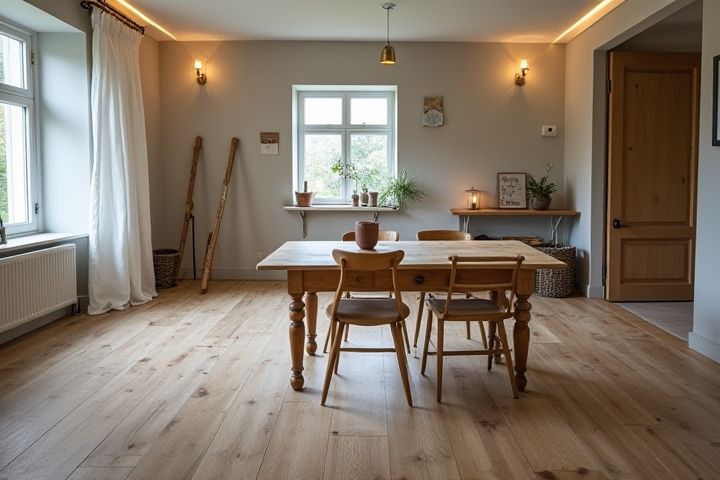
Homeowners seeking to enhance their living spaces often need house renovation, especially if they reside in older properties that require modern upgrades. Individuals aiming to increase their property's value or appeal should consider renovations like kitchen remodels, bathroom updates, or landscape enhancements. You may also need to renovate if you have growing family needs, necessitating more functional spaces or additional rooms. Properties showing signs of wear and tear, such as outdated designs or structural issues, can significantly benefit from renovations to ensure safety and comfort. Furthermore, energy-efficient upgrades attract environmentally conscious homeowners, making renovations essential for both aesthetic and functional improvements.
Who Needs House Renovation
Costs and budgeting
Homeowners considering house renovation must prioritize understanding costs and budgeting to ensure a successful project. On average, renovations can range from $15,000 for minor updates to over $100,000 for extensive remodels. Create a detailed budget that includes labor, materials, permits, and unexpected expenses, which can account for up to 20% of your total budget. By accurately assessing your financial capacity and maintaining a contingency fund, you can navigate your renovation with confidence, maximizing your investment.
Contractor selection
Selecting the right contractor is crucial for a successful house renovation, impacting both the quality and timeline of the project. Homeowners should research and compare at least three licensed and insured contractors with strong local reputations. Requesting detailed estimates and reviewing past work will help you assess their craftsmanship and reliability. Trustworthiness and communication skills are essential, as good contractors keep you informed throughout every renovation phase.
Timeline management
Homeowners planning a renovation project should prioritize timeline management to ensure timely completion and minimize disruptions. A well-structured timeline helps allocate resources efficiently, typically breaking down tasks into phases like planning, demolition, construction, and finishing touches. For example, a kitchen renovation may take an estimated 6 to 8 weeks, with specific milestones such as cabinet installation occurring within the first month. Adopting effective timeline management strategies can lead to a smoother renovation experience, saving you both time and money.
Necessary permits
Homeowners planning renovations must obtain necessary permits to ensure compliance with local building codes. Depending on your project's scope, including structural changes or electrical work, you may require specific approvals from your municipality. The typical permit application process can take anywhere from a few days to several weeks, so early planning is essential. Ignoring permit requirements can lead to costly fines or issues when selling your home, making it crucial to check local regulations before beginning any renovation work.
Design planning
Homeowners seeking to enhance their living space should prioritize design planning in their renovation projects. Engaging a professional designer can improve functionality and aesthetics, ensuring that every square foot of your home is utilized efficiently. According to industry studies, thoughtful design planning can increase property value by up to 15%. Investing in quality materials and innovative layouts not only maximizes comfort but also aligns with your personal style, leading to a more satisfying living experience.
Material selection
Homeowners undertaking a house renovation should prioritize material selection to ensure durability and aesthetic appeal. Choosing high-quality materials, such as energy-efficient windows, sustainable flooring options, and moisture-resistant paint, can contribute to long-term savings and enhanced comfort. For instance, using reclaimed wood can reduce environmental impact while adding unique character to your space. Selecting the right materials not only influences the overall design but also significantly affects maintenance costs over time.
Energy efficiency
Homeowners looking to reduce energy costs and improve comfort should consider house renovation with a focus on energy efficiency. Upgrading insulation, windows, and doors can yield savings of 20-30% on heating and cooling bills. Implementing energy-efficient appliances may reduce your energy consumption by 10-50% depending on the equipment. Investing in smart home technology can further enhance energy management, allowing you to monitor and control usage effectively, potentially leading to long-term financial benefits.
Impact on property value
Homeowners looking to increase their property value should consider house renovation as an essential investment. Renovations, such as kitchen upgrades, bathroom remodels, or energy-efficient enhancements, can significantly elevate your home's market appeal and resale potential. Addressing structural issues or modernizing outdated designs not only improves functionality but also attracts prospective buyers willing to pay a premium. By strategically focusing on high-return renovations, you can enhance both the aesthetic and financial value of your property, making it a more valuable asset in today's competitive real estate market.
Potential disruptions
Homeowners contemplating house renovations should be acutely aware of potential disruptions that could arise during the process. Renovations can significantly impact daily routines, often leading to restricted access to certain areas of the home, which may last from a few days to several weeks. Common disruptions include noise levels exceeding 85 decibels, dust accumulation that affects air quality, and limited access to essential facilities like kitchens or bathrooms. Being mindful of these factors will help you plan better and minimize the inconveniences associated with renovation projects.
Safety considerations
Homeowners, especially those with aging properties, should prioritize safety considerations in house renovations. According to the National Safety Council, unintentional injuries account for over 170,000 deaths annually, highlighting the importance of addressing hazards like outdated electrical systems and structural damages. Implementing features such as slip-resistant flooring and installing smoke detectors can significantly reduce risks for family members. Utilizing professional contractors ensures that safety codes and regulations are met, providing peace of mind during the renovation process.
